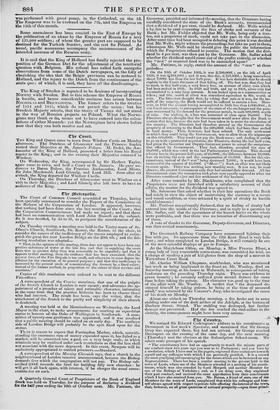A Quarterly General Court of Proprietors of the Bank of
England Stock was held on Thursday, for the purpose of declaring a dividend for the half-year ending the 10th of October nest. Mr. Pattison, the Governor, presided and informed the meeting, that the Directors having carefully considered the state of the Bank's accounts, recommended that a dividend of 4 per cent. should be declared. Mr. Wells wished a by-law to be read respecting the fees of clerks and servants of the Bank ; but Mr. Fielder objected that Mr. Wells, being only a trus- tee, not a proprietor of stock, could not take part in the discussion. After some time had been occupied in debating this point it was decided that Mr. Wells, might witness the proceedings but take no part in them, whereupon Mr. Wells said he should give the public the information which the Proprietors refused to receive. The motion that the divi- dend be 4 per cent. was then put by the Governor. Mr. Sadler asked whether the dividend would come out of the profits entirely, or whether the "rest" or reserved fund was to be encroached upon? Pattison, in reply, stated the amount of the "rest" at three periods— On the 10th of October 1835, it was 2,709,000/. ; on the 5th of April 1836, it was 2.734,000/.. and it was, this day, 2,727,000/. ; being somewhere about 7,0001. less than die last half-year. It was here desirable that he should explain to the Court the cause of that falling off. The fact was, that they had to meet, in this half-year, a very heavy loss, on account of silver coin which had been melted in 1631. In 1828 and 1829, and up to 1831, silver coin had accumulated to a very large amount. loxes looked upon as a representative or token; and 60s. worth of silver was considered equivalent to 60s. worth of coin. The Directors thought that, by taking that coin as it was, for the be- nefit of the country, the Bank would not be suffered to sustain a loss. How. ever, in 1431 the amount having accumulated to little less than 1,000,0001., it was found necessary, in consequence of the state of the exchanges,and the pres- sure occasioned by the demand for the precious metals, to melt 600,0001. worth of coin. On melting it, aloss was sustained of close upon 70,0001. The Directors always thought that the Government would never allow the Bank to sustain that loss, because the coin had been taken in to assist the circulation of the country. The Directors had therefore pressed on the Government the propriety of returning to the Bank the 600,0001. which had been thus melted in hard money. That, however, had been refused. The only settlement to which they could bring the Government, was to allow them the seignorage on this 600,0001. They would not pay the Bank more; and, finding it useless to go on with a protracted negotiation, the Directors, during the last half-year, had given the Governor and Deputy-Governor power to accept the compensa- tion, offered by Government. They had, therefore, accepted the sum of 38,0001., which was voted in the last Parliamentary Estimates. This showed a heavy loss in the present half-year, of 29,0001.; the difference between 70,000/. loss on melting the coin and the compensation of 38,000/. But for this cir- cumstance, instead of the" rest" being decreased 7,0001., it would have been increased to the amount of 24,0801. ("Hear !") Such an affair was not likely to occur again. There was nothing now standing over. It was not, he must observe, the present Government only that had resisted their demand. All the Governments since the transaction took place were equally opposed to what the Directors considered a just and fair settlement of this business.
After some remarks by Mr. Blackburne, who complained that the Proprietors were not furnished with a satisfactory account of their affitirs, the motion for the dividend was agreed to. Mr. Salomons then asked whether in their late operations the Bank had solely in view the object of maintaining the currency in a secure and sound condition, or were actuated by a spirit of rivalry to hostile establishments?
Mr. Pattison unequivocally declared, that no feeling of rivalry bad entered into the minds of the Directors; and in reply to a question by Mr. Sadler, said that the operations of the branch banks on the whole were profitable, and that there was no intention of discontinuing any of them.
A vote of thanks to the Governor, Deputy-Governor, and Directors, was then carried unanimously.


























 Previous page
Previous page